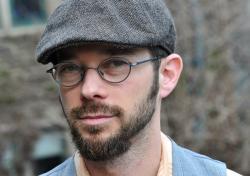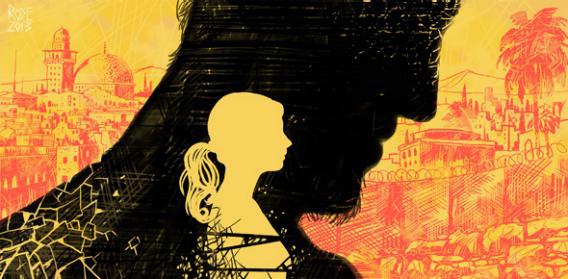For many years, I kept two battered slips of paper in my wallet. One read, “I am a speck of dust.” And the other, “The world was created for me.” Recognizing that both those directives are simultaneously true and urgent can be a life’s work, according to the teachings of Rabbi Bunim of P’shiskha. But when my family arrived in Jerusalem just around this time last year, for strange, mystical reasons beyond my control, only the one that said “I am a speck of dust” remained.
When people asked why we were taking our children from bucolic central Virginia to an unhinged nuclear Middle East for a sabbatical last year, I tended to not answer, mumble something about a year with cousins and grandparents, or mumble some obscure kabbalistic formulation about tzimtzum—the act of contraction. We would be in a tiny apartment in a big city, with two weeks’ worth of clothes, a few toys and books, and then we’d see what it meant to truly become a speck of dust.
David Harris-Gershon’s fierce new memoir, What Do You Buy the Children of the Terrorist Who Tried to Kill Your Wife?, takes the opposite trajectory. It is a book about going to Jerusalem to discover that the world was created just for you. Which strikes me as part of the problem. Harris-Gershon’s journey is a painful one, and he chronicles it with brutal honesty. His wife, Jamie, was critically injured in a bomb blast that ripped open a cafeteria at Hebrew University in 2002. Several of their dear friends were killed in the incident. In order to overcome her trauma and, as he eventually recognized, his own lingering rage and fear, they left their Jewish studies program in Israel for Washington, D.C., slowly reclaimed their lives and careers, started a family, and tried to move on. Jamie managed to do so. Harris-Gershon struggled with panic attacks, insomnia, and control issues for years.
The memoir sets out Harris-Gershon’s slow realization that for him, closure would require meeting with the jailed terrorist, Mohammad Odeh, who perpetrated the attack, and when that effort failed, in meeting and reconciling with Odeh’s grieving East Jerusalem family. (Odeh will remain in an Israeli prison for the rest of his life.) The slow journey is from solitude to empathy and an effort to see the world through the eyes of them.
The book is gaining attention chiefly for the usual reasons: as a piece of political journalism about who in the Middle East hates whom the most (and also who hates themselves the most, always a popular subgenre). But for anyone who’s grown weary of (or feels overwhelmed by) that discussion, or who would like to take a moment to reflect more deeply in this New Year season, there’s a better way to think about this story, as a tale of redemption and new beginnings and of truly embracing the other. Harris-Gershon’s story is not really about Middle East politics so much as it is a story of healing—a debate about whether South African–style reconciliation and restorative dialogue can really bring about closure after an event of unspeakable pain and violence.
That’s a slightly tricky proposition in this instance, in no small part because rarely has a book about empathy and reconciliation been so full of loathing and outrage. Harris-Gershon pretty systematically rejects any offers of help, friendship, support, or healing, or he mashes them through a fine mesh sieve of sarcasm and second-guessing. Harris-Gershon seems less interested in the work of embracing the “other” than in the rejection and renunciation of the community from which he hailed. Indeed the most beautiful and powerful moments in the book take place when he interacts with children—his own daughters whom he clearly adores, and at the very end, with the children of Odeh himself, who he really does embrace with a breathtakingly open heart. But it’s the adults Harris-Gershon seems to have given up on completely, and it’s hard to find reconciliation in the absence of truly guilty humans.
Harris-Gershon’s book is ultimately a powerful and harsh tale of solitude, of perfect lonely rage. (About halfway through the narrative, every colloquy is between himself and himself; for much of the book other voices disappear altogether.) The relief I felt when Harris-Gershon finally allowed himself to sit and listen to the voices of Odeh’s family was the closest thing to actual reconciliation you could find. Harris-Gershon closes his own narrative uncertain that restorative dialogue is the answer, but he’s finally persuaded that the only way forward is to believe that “they are not monsters.” You are not ever fully certain he comes away healed, but he finally seems to be less alone.

Photo courtesy of Pittsburgh Post-Gazette
I confess that I found it difficult reading about Harris-Gershon’s journey in the days after my family’s return from the same Middle East, perhaps because our experience was completely different from his. I am not naïve enough to say that had we faced some terrible violent tragedy as he did, our experiences might have been more similar. But we did not go to find meaning or closure. We did not go in anger or to allocate blame. We didn’t go to determine—once and for all—which people were “us” and which people were “them.” In some ways, I suspect we went to disappear. My own year in Jerusalem was, in contrast to Harris-Gershon’s, a year without monsters and also without solitude. It was a parade of teachers who knew best about everything from rationalizing fractions in Hebrew to gluten-free recipes. It was about neighbors with platters of food, and stringy stray cats, and yes, drama and trauma, in which we could lose ourselves absolutely, and often did. But perhaps because we were looking for a very different kind of healing, or perhaps because we never suffered the trauma Harris-Gershon’s family did, it was a year of recognizing that the Arab children who played in the neighborhood park every afternoon were as much us as them. What we call “restorative dialogue” on this side of the ocean is mostly just called soccer on Bar Kochba Street.
Coming back to North America—where disappearing into time, and history, and community, is alarming, if not irresponsible—is doubly complicated when you start to realize that this is a whole world that really is constructed just for us and to serve our own fascination with us. I still have no idea what I learned from the last year abroad, beyond the fact that becoming a speck of dust is neither a punishment nor a crime. As my husband was quick to point out, in Jerusalem every stone you step on and every wall you walk past is built upon stones and walls from other conquerors, on the rubble of the vanquished that came before. It’s difficult to maintain the belief that the whole world was created for you, when you come to understand that it was in fact destroyed, rebuilt, and destroyed again, all before you were even a speck of dust to begin with.
—
What Do You Buy the Children of the Terrorist Who Tried to Kill Your Wife? by David Harris-Gershon. Oneworld Publications.
See all the pieces in this month’s Slate Book Review.
Sign up for the Slate Book Review monthly newsletter.
